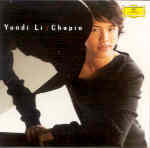In 2000 Yundi Li became the youngest candidate to place first in the prestigious Warsaw Chopin Competition. His victory earned him a slew of international concerts and a recording agreement with DG. Judging from his all-Chopin debut recital, you can hear why Li won. He commands a beautiful, rounded tone, a creamy legato, and a technique that can handle either the B minor sonata’s taxing finale or the “Winter Wind” etude with no sweat. His musicianship is direct, mainstream, pretty on the surface, and, for lack of a better word, “normal”. Listening to Li’s Chopin for the first time is not unlike having a blind date with a gorgeous partner who smiles at the right times, always laughs at your jokes, and never disagrees with you nor tells you things you don’t already know. It’s only when you shop around, so to speak, that you discover the Sonata’s darker aura, polyphonic dimensions, and dramatic power (Rubinstein, Argerich, Arrau, Katchen, Kapell, Gilels, Lipatti, and two superb versions in EMI’s Debut series from Alex Slobodyanik and Nelson Gorner).
Li takes particular care to articulate the Grande Polonaise’s tricky ornamentation but loses a bit of the music’s pomp and swagger in the process. By contrast, the pianist invests the F-sharp Op. 15 No. 2 Nocturne’s decorative writing with melodic specificity and meaning, and allows the middle section to build to a full, organic climax. The Études and the two Op. 9 Nocturnes, though, sound bland and uninvolved next to dozens of more characterful versions (Moravec’s Nocturnes, Horowitz’s “Black Key” Étude, and Nelson Freire’s torrential romp through the “Winter Wind”). Perhaps this talented and extremely capable pianist will blossom into a more interesting and emotionally engaging artist as his career develops.
































